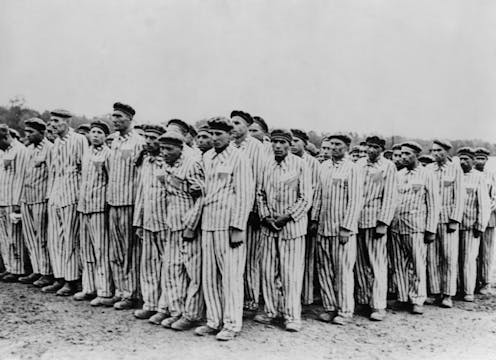Why legislation is needed to make Holocaust education more prominent in public schools: 5 questions answered
- Written by Jennifer Rich, Assistant Professor; Director, Rowan Center for Holocaust and Genocide Studies, Rowan University

Editor’s note: Jennifer Rich, an assistant professor of sociology at Rowan University in New Jersey, is a Holocaust scholar[1] and director of the Rowan Center for Holocaust and Genocide Studies. Here, Rich explains how the “Never Again Education Act,” which the U.S. House passed[2] 393-5 on International Holocaust Remembrance Day[3] in January, would make lessons about the Holocaust more prevalent in American education.
1. Why is the ‘Never Again Education Act’ needed?
Research shows that adults[4] and millennials[5] in the United States have significant gaps in what they know about the Holocaust.
For instance, while 6 million[6] Jews were killed in the Holocaust, 41%[7] of millennials believe the number is 2 million or fewer.
The Never Again Education Act[8] will seek to address these kinds of gaps in knowledge by making Holocaust education a bigger and more important part of education in various middle and high schools across the country. The legislation provides US$2 million a year, for five years, to be given to the United States Holocaust Memorial Museum[9]. The museum will distribute the money to various teachers and educational leaders who apply for grants to teach kids about the Holocaust.
Schools without any Holocaust education in place will get top consideration. The museum must also increase digital and print educational resources, do more to help teachers and future schoolteachers become more knowledgeable about the Holocaust and teach it more effectively, and conduct research on the impact of Holocaust education.
2. Why can’t schools just teach Holocaust history without a special law?
History in general is not a tested subject[10] like math, reading and writing. And the Holocaust itself is often limited, as I found in forthcoming research, to one or two class periods a year – usually as part of a lesson about World War II more broadly.
As a result, teachers rely heavily on textbooks when teaching about the Holocaust and end up spending a minimum amount of class time on the subject. I have found[11] that teachers can be uncomfortable teaching about the Holocaust because they worry about their lack of knowledge on the subject. They may also be uncertain of how to relay such intense information to their students.
3. How big a problem is Holocaust denial and distortion?
Holocaust denial and distortion[12] do similar things.
Holocaust denial denies that the Holocaust ever happened. Holocaust distortion minimizes the events that took place. While both have long been present[13] in both American and global conversations, recently these have been at the forefront of discussions in new ways.
For instance, Holocaust denial has taken place in schools. It has even occurred at schools with state-mandated Holocaust education, such as Florida[14], where a principal told a parent that he wasn’t permitted as a district employee to say the Holocaust was a “factual, historical event.” In New Jersey[15], the first state to require Holocaust education, a teacher urged students to question the Holocaust.
Unfortunately, social media enables[16] denial and distortion to proliferate in unprecedented ways.
4. Why doesn’t the act deal with atrocities that took place on US soil?
The short answer is that this proposed law is intended to improve the quality of Holocaust education, specifically.
A skilled teacher can, and should, make connections between the Holocaust and other genocides and mass atrocities by looking at recurring historical themes including – but not limited to – racism, xenophobia and nationalism. Additional legislation, as well as a hard and honest look at America’s complicated history[17], would be helpful next steps.
5. What evidence is there that Holocaust education can reduce racial hatred?
There is some evidence[18] that Holocaust education will reduce anti-Semitism[19] in particular and all kinds of bias in general.
This work may not be easy, but helpful practices[20] include using precise language in classrooms, having a clear set of goals in teaching and using age-appropriate lessons.
References
- ^ Holocaust scholar (scholar.google.com)
- ^ passed (maloney.house.gov)
- ^ International Holocaust Remembrance Day (www.ushmm.org)
- ^ adults (www.pewforum.org)
- ^ millennials (www.claimscon.org)
- ^ 6 million (encyclopedia.ushmm.org)
- ^ 41% (www.claimscon.org)
- ^ Never Again Education Act (docs.house.gov)
- ^ United States Holocaust Memorial Museum (www.ushmm.org)
- ^ tested subject (neatoday.org)
- ^ found (www.drjenniferrich.com)
- ^ Holocaust denial and distortion (www.splcenter.org)
- ^ long been present (encyclopedia.ushmm.org)
- ^ Florida (www.palmbeachpost.com)
- ^ New Jersey (theconversation.com)
- ^ social media enables (www.researchgate.net)
- ^ complicated history (dataspace.princeton.edu)
- ^ some evidence (doi.org)
- ^ anti-Semitism (theconversation.com)
- ^ helpful practices (www.ushmm.org)
Authors: Jennifer Rich, Assistant Professor; Director, Rowan Center for Holocaust and Genocide Studies, Rowan University

